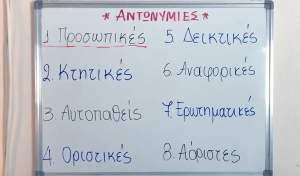Difference between revisions of "Language/Modern-greek-1453/Grammar/Pronouns"
< Language | Modern-greek-1453 | Grammar
Jump to navigation
Jump to search
m (Quick edit) |
m (Quick edit) |
||
| Line 1: | Line 1: | ||
[[File:1606-antonymis.jpg|thumb|none]] | [[File:1606-antonymis.jpg|thumb|none]] | ||
<div | <div class="pg_page_title"> Examples pronouns to mark the genitive case</div> | ||
{| class="wikitable" | {| class="wikitable" | ||
!Ελληνικά (Greek) | !Ελληνικά (Greek) | ||
| Line 130: | Line 130: | ||
|} | |} | ||
== | ==Other Lessons== | ||
* [[Language/Modern-greek-1453/Grammar/The-conjugations-in-Greek|The conjugations in Greek]] | * [[Language/Modern-greek-1453/Grammar/The-conjugations-in-Greek|The conjugations in Greek]] | ||
* [[Language/Modern-greek-1453/Grammar/Modern-Greek-Nouns---Endings|Modern Greek Nouns Endings]] | * [[Language/Modern-greek-1453/Grammar/Modern-Greek-Nouns---Endings|Modern Greek Nouns Endings]] | ||
| Line 141: | Line 141: | ||
* [[Language/Modern-greek-1453/Grammar/Verbes-elliptiques,-impersonnels-et-irréguliers|Verbes elliptiques, impersonnels et irréguliers]] | * [[Language/Modern-greek-1453/Grammar/Verbes-elliptiques,-impersonnels-et-irréguliers|Verbes elliptiques, impersonnels et irréguliers]] | ||
* [[Language/Modern-greek-1453/Grammar/Punctuation|Punctuation]] | * [[Language/Modern-greek-1453/Grammar/Punctuation|Punctuation]] | ||
<span links></span> | |||
Revision as of 20:20, 26 March 2023
Examples pronouns to mark the genitive case
| Ελληνικά (Greek) | Greek (Transliteration) | English | Γαλλικά (Français) |
|---|---|---|---|
| Αυτή η γάτα είναι της φίλης μου. | Aftî I gàta îne tis fîlis mou. | This is my friend's cat. | Ce chat est à mon amie. |
| Εκείνος ο σκύλος είναι του φίλου μου. | Ekînos o skîlos îne tou fîlou mou. | That is my friend's dog | C'est le chien de mon ami |
| Αυτά είναι τα παιχνίδια των παιδιών μου. | aftà îne ta pechnîdia ton pediôn mou | These are my children's toys | Ce sont les jouets de mes enfants |
| Μαγειρεύω κάθε μέρα. | magirèvo kàthe méra. | I cook every day. | Je cuisine toujours |
| Αυτό είναι το γραφείο του συζύγου μου. | Aftô îne to grafîo tou syzîgou mou. | This is my husband's office. | C’est le bureau de mon époux. |
| Αυτό είναι το δικό μου αυτοκίνητο. | Aftô îne to dikô mou aftokînito. | This is my car. | Cette voiture est à moi. |
| Εκείνο είναι το αυτοκίνητο του γιού μου. | Ekîno îne to aftokînito tou gioû mou. | That is my son's car. | C'est la voiture de mon fils. |
| Η κόρη μου προτιμά το ποδήλατο. | I kôri mou protimà to podîlato. | My daughter prefers to ride the bike. | Ma fille préfére faire du vélo. |
| Ράψε το κουμπί του πουκαμίσου σου που κόπηκε. | ràpse to koubî tou poukamîssou sou pou kôpike. | Sew your shirt's button. | Couds le bouton qui a sauté de ta chemise. |
| Πού είναι το κλειδί του σπιτιού ; | poù îne to klidî tou spitioù ? | Where's the key of the house? | Où est le clé de la maison ? |
| Από χθες ο υπολογιστής μου δεν λειτουργεί. | apo chtes o ypologistîs mou den litourgî. | Since yesterday, my computer has stopped working. | Depuis hier, mon ordinateur ne fonctionne plus. |
| Αύριο το πρωί θα καλέσω τον τεχνικό. | Avrio to proî tha kalésso ton technikô. | Tomorrow morning I'll call the technician. | Demain matin je vais appeler le technicien. |
| Ποιοί είναι οι γονείς αυτού του παιδιού ; | pchî îne i gonîs aftoù tou pedioù? | Who are the parents of this child? | Qui sont les parents de cet enfant ? |
| Πώς θα το πάω στο σπίτι των γονιών του ; | Pôs tha to pào sto spîti ton goniôn tou? | How can i take him to his parents house? | Comment dois-je l'emmener chez ses parents ? |
| Το σπίτι τους είναι στα αριστερά του δρόμου. | to spîti tous îne sta aristerà tou drômou. | Their house is located on the left of the street. | Leur maison est sur la gauche de la rue. |
| Απέναντι από το δικό μας σπίτι,είναι το σπίτι της γιαγιάς μου. | apénanti apo to dikô mas spîti,îne to spîti tis giagiàs mou | Across our house is my grandmother's house. | La maison de ma grand-mère est en face de la nôtre. |
| Ποια είναι η πρωτεύουσα της Ελλάδας ; | Pià îne i protévoussa tis Ellàdas ? | What is the capital of Greece? | Quelle est la capitale de la Grèce ? |
| Ποιος είναι ο τίτλος αυτού του βιβλίου; | Piôs îne o tîtlos aftoù tou vivlîou ? | What is the title of this book? | Quel est le titre de ce livre ? |
| Ποιοί είναι οι νέοι σας γείτονες ; | pchî îne i néi sas gîtones ? | Who are your new neighbors? | Qui sont vos nouveaux voisins ? |
| Τα παιδιά που παίζουν στην αυλή,είναι δικά σου ; | ta pedià pou pézoun stin avlî ,îne dikà sou ? | Are yours the children who playing in the yard? | Les enfants qui jouent dans la cour sont à vous ? |
| Πόσες ημέρες διαρκούν οι διακοπές των Χριστουγέννων ; | pôsses imères diarkoùn i diakopés ton Christougénon ? | How many days lasts Christmas holidays? | Combien de jours durent les vacances de Noël ? |
| Φάγατε το μεσημεριανό σας φαγητό ; | fàgate to messimerianô sas fagitô ? | Did you ate your lunch? | Avez-vous pris votre déjeuner ? |
| Πόσες ώρες περπατούσες ; | pôsses ôres perpatoùsses ? | How many hours did you walk? | Combien d'heures avez-vous marché ? |
|
Other Lessons
- The conjugations in Greek
- Modern Greek Nouns Endings
- Greek phonology of the consonants : Φφ Θθ
- Interjections
- Word Accentuation
- Irregular adjectives
- Greek Adverbs
- Indefinite pronouns
- Verbes elliptiques, impersonnels et irréguliers
- Punctuation
